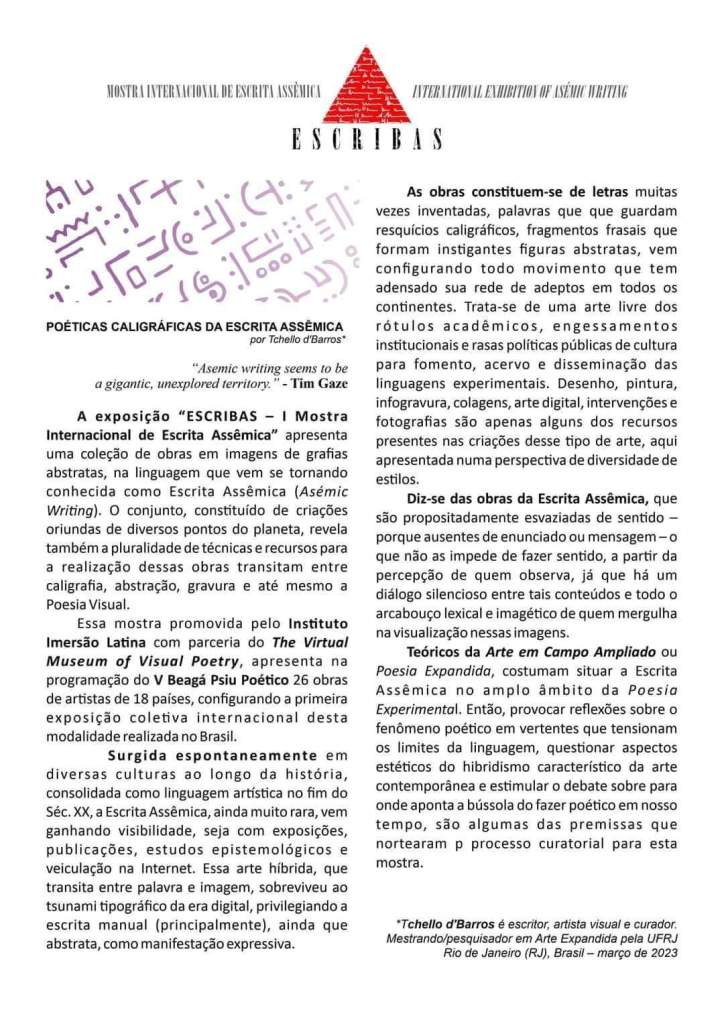Archivi categoria: art
notes / miron tee. 2023
escribas @ belo horizonte (brasil), international exhibition of asemic writing
“ecotono. metamorfosi dei confini”: a rho/milano dal 18 aprile
Dal 18 al 23 aprile 2023, all’interno della cornice del Salone del Mobile.Milano, ISIA Faenza partecipa al SaloneSatellite, fondato e curato da Marva Griffin per dare spazio ai designer under 35. L’istituto di formazione superiore faentino è presente tra le ventisette Scuole e Università del Design internazionali di questa 24° edizione con il progetto espositivo ECOTONO – metamorfosi dei confini.
Nell’ambito del tema di quest’anno, Design Schools – Universities / BUILDING THE (IM)POSSIBLE Process, Progress, Practice, l’ISIA di Faenza ha risposto alla domanda Design: DOVE VAI?, indagando l’ecotono, termine che definisce quell’ambiente di transizione tra due ecosistemi limitrofi che, in quanto “luogo di confine”, presenta una straordinaria biodiversità, complessità e ricchezza. Se è accertato che proprio in questa zona interstiziale – che favorisce scambio e condivisione – avvengono le trasformazioni più inaspettate e significative, il concetto si presta bene a diventare metafora della “scuola” come spazio di fermento e di incontro tra la sfera della formazione e il mondo del lavoro.
maciunas, “scritti fluxus”, abscondita
Sandro Ricaldone
GEORGE MACIUNAS
Scritti Fluxus
a cura di Patrizio Peterlini e Angela Sanna
Abscondita, 2023
Il volume raccoglie, per la prima volta in una monografia in lingua italiana, una significativa selezione di testi, pubblici e privati, di George Maciunas, l’inventore di Fluxus. Lituano di nascita e americano di adozione, Maciunas ebbe una personalità sicuramente complessa, di grande cultura e curiosità. Fortemente convinto delle sue posizioni collettiviste, maniaco della catalogazione e della sistematizzazione del sapere in complessi schemi e diagrammi, instancabile lavoratore, grafico sopraffino ma anche affarista ingenuo, Maciunas fu un imprenditore fallimentare, tanto parsimonioso da sembrare avaro, così altruista da investire tutti i propri averi in progetti utopistici al servizio della comunità, di artisti in primis. Da questa raccolta emerge proprio l’ostinata caparbietà, l’inesauribile volontà, l’enorme quantità di energia profusa da Maciunas nel continuo quanto rovinoso tentativo di organizzare e dirigere Fluxus: qualcosa di per sé indefinito, incontrollabile, contraddittorio. Ci è riuscito? Ovviamente no. Com’è possibile, allora, che Fluxus sia non soltanto esistito ma che
continui ancora oggi a incuriosire e a suscitare interesse? È proprio questo il mistero di Fluxus e il fascino, tutt’ora intatto, del suo ideatore.

coloring book, 1966 (de-collage) / ray craig. 2023

.
finish / luc fierens. 2019
installance #0174: il coriandolo “a” / the “a” confetti
sotto il selciato c’è la spiaggia: 10 marzo 2023 / angelo pretolani
SOTTO IL SELCIATO C’È LA SPIAGGIA
VENERDÌ 10 MARZO 2023
Angelo sorride, davanti ad un muro bianco. Nel corso di questa settimana ha immerso una giovane foglia di alloro in un secchio colmo d’acqua piovana; ha compiuto queste abluzioni con estrema lentezza accompagnate da una nenia a labbra chiuse. Esperienze di confine, esercizi di derealtà.
Questa performance non ha prodotto alcun disegno e non è stata prevista documentazione fotografica dell’evento.
‘nero’ a lubiana _ “could it be tried somewhere?”
Apre domani, 9 marzo, Could it be tried somewhere?, la mostra-reading room che l’International Centre of Graphic Arts di Lubiana dedica agli esperimenti editoriali, alle indagini e ai processi di rappresentazione che NERO ha sviluppato dal 2004 a oggi.
Era il 2004 e a Roma venivano stampate le prime copie di NERO, una nuova rivista free-press di arte e cultura contemporanea. Influenzati da interessi trasversali ma riconducibili ad un unico macro-insieme, quello delle arti contemporanee, Francesco de Figueiredo, Luca Lo Pinto, Valerio Mannucci e Lorenzo Micheli Gigotti danno vita a un progetto editoriale, desiderosi di occupare gli spazi con le idee – siano essi un museo, un bar o un centro sociale – essere interdisciplinari, generare dibattito e sperimentare.
Nell’arco di qualche anno, NERO diventa una rivista trimestrale in lingua inglese e una casa editrice specializzata in libri d’artista, saggistica teorica, edizioni e cataloghi, assecondando la spontanea esigenza di connettersi a un discorso culturale che superasse i confini nazionali o cittadini, per esplorare gli immaginari del mondo che verrà e le questioni rilevanti del presente: dalla critica dell’Antropocene al rapporto uomo-macchina, dalle pedagogie radicali alle prospettive di genere, dal capitalismo delle piattaforme alle nuove estetiche digitali.
Il progetto fa parte della più ampia mostra Middleman dell’artista Honza Zamojski. In maggio, NERO pubblicherà con lo stesso titolo un libro d’artista di Zamojski, una ricerca visiva e poetica sul Middleman, sulla sua vita quotidiana e il complesso di condizioni sociali e culturali in cui si colloca.
Could it be tried somewhere?
10. 3.–28. 5. 2023
Mednarodni grafični likovni center
Pod turnom 3, Ljubljana









